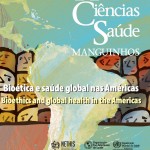March 15th, 2021
Between 2002 and 2003, a coronavirus epidemic broke out in China and spread across the world, infecting more than 8,000 people and killing about 800.

Infectious Change Reinventing Chinese Public Health After an Epidemic, Stanford University Press, 2016. Winner of the 2019 Foundation for the Sociology of Health and Illness Book Prize, sponsored by the British Sociological Association.
The book investigates local Chinese public health institutions in Southeastern China, examining how the outbreak of the Severe Acute Respiratory Syndrome (SARS) re-imagined public health.
Researchers of Unicamp, Universidade Estadual de Campinas, Jonatan Sacramento and Maria Conceição da Costa reviewed the book in HCSM (vol.27 no.4 Oct./Dec. 2020).
Read in HCS-Manguinhos:
Sacramento, Jonatan and Costa, Maria Conceição da. Reinventing Chinese public health after a SARS (Severe Acute Respiratory Syndrome)/Coronavirus epidemic. Hist. cienc. saude-Manguinhos, Oct 2020, vol.27, no.4, p.1377-1379. ISSN 0104-5970





